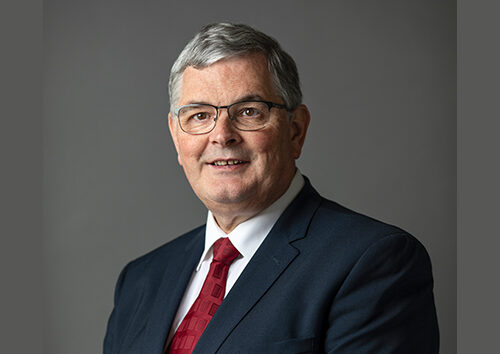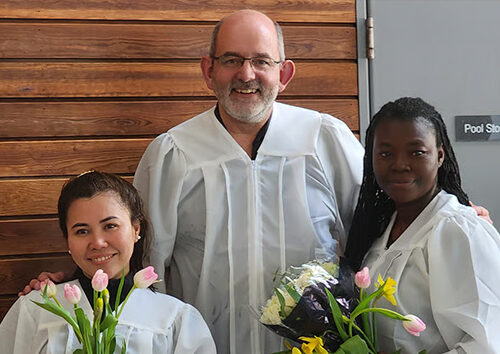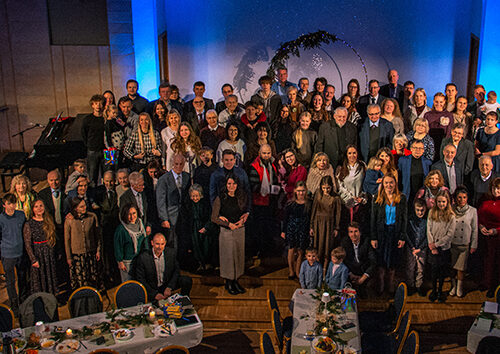23 February 2016 | St Albans, UK [Karen Holford] “Are we trying to save the world in our own strength?” That was the question Dr Torben Bergland asked during a presentation to Trans-European Division office staff on Tuesday, 23 February. He emphasised that God is doing the work of saving the world, and “He has invited us to participate in this mission to bless us, not to exhaust us.”
Dr Bergland M.D., a psychiatrist from Norway, is one of the newest members of the TED team. His appointment as Health Director emphasises the importance that the Division is placing on our mental health and emotional wellbeing, alongside our physical and spiritual health.
Bergland described the difference between being motivated and energised in our work and burning out, at which stage our lives become imbalanced, and we become increasingly exhausted and demotivated. When we are positively engaged in our employment we work well with our colleagues, we achieve our goals and we feel empowered. However, if we work long hours, without rebalancing our lives, we begin to feel resentful towards our work, our colleagues, and even those we are trying to help. Soon we become physically, emotionally and spiritually exhausted, our work is less effective, and it’s harder to achieve our goals. We become negative and cynical, and then we begin to criticise those around us.
There are six main dimensions of our working life that can contribute to our well-being or our stress: our workload; how much control we have over our workload; whether we feel appropriately rewarded for our work; what kind of relationships we have with our colleagues; whether we feel that our employer and colleagues have fair expectations of our work; and whether our values match the values of the workplace.
The more hours we spend at work the unhappier we tend to be, and equally the more time we spend thinking about work outside of our working hours. In a survey exploring the emotional effects of working long hours 27% of people felt depressed, 34% felt anxious and 58% felt irritable.
Recognise your risk
 Bergland explained the different stages of burnout, and indicated them with coloured warning lights. “As you read through the levels ask yourself where you are, and what you might need to do to rebalance your work/life ratio,” he stated. One study about the stress levels of priests in Norway found that 25% of them had significant symptoms of burnout.
Bergland explained the different stages of burnout, and indicated them with coloured warning lights. “As you read through the levels ask yourself where you are, and what you might need to do to rebalance your work/life ratio,” he stated. One study about the stress levels of priests in Norway found that 25% of them had significant symptoms of burnout.
Prelude (green light – but proceed with caution): At this stage there are no symptoms of burnout, but you may be at risk of progressing into it. It often starts when you find it difficult to set clear boundaries and maintain them, a struggle that many church workers and pastors experience. You might find it difficult to switch off from work and relax. Your self-esteem and identity may be closely connected with social recognition and your sense of success, so you are enthusiastic, energised and motivated.
Stagnation (yellow light – be careful and try to manage your stress in more effective ways): At this stage you begin to feel as if the demands on your time and energy exceed your resources. You may start to feel confused, bewildered, and insecure. You begin to lose your vision as you try just to survive the day and keep on top of your to-do list. You start to feel tired, demotivated, and irritable. Your relationships with your colleagues, family and friends may begin to suffer.
 Frustration (orange light – you are in danger of burning out. You need to stop and find help): By the time you reach this stage you may be questioning yourself and your calling, and losing confidence in your ability to work effectively. Work can feel like a heavy cloud over your life, blocking out the sunlight and the warmth. You may start to feel guilty because of your lack of motivation for work and ministry. You could also feel ashamed and concerned that other people will notice that you’re failing, so you may withdraw from your colleagues, and start to feel dehumanised and depersonalised.
Frustration (orange light – you are in danger of burning out. You need to stop and find help): By the time you reach this stage you may be questioning yourself and your calling, and losing confidence in your ability to work effectively. Work can feel like a heavy cloud over your life, blocking out the sunlight and the warmth. You may start to feel guilty because of your lack of motivation for work and ministry. You could also feel ashamed and concerned that other people will notice that you’re failing, so you may withdraw from your colleagues, and start to feel dehumanised and depersonalised.
Despair (red light – it is vital that you address your exhaustion as soon as you can): At this stage you are physically, mentally and spiritually exhausted. Your relationships are suffering. It feels as if all the joy has been crushed out of your life. Even small tasks can feel overwhelming, and you experience physical, mental and spiritual exhaustion. Take time to rest and restore your healthy life style. Once burnout has been established it can take months or even years to recover.
The simple solution
“The simple solution to burnout,” says Bergland, “is to get a life!” The risk of burn out is greatly reduced when we balance our work with positive life activities:
![]() Move: take every opportunity to move around and be active because physical activity counteracts the stress hormones in our bodies, and helps us to think more clearly and work more effectively.
Move: take every opportunity to move around and be active because physical activity counteracts the stress hormones in our bodies, and helps us to think more clearly and work more effectively.
Enjoy: spend time every week doing something purely for the pleasure it gives you and not out of a sense of duty. Work on your hobbies, meet up with friends, read a new book, appreciate your garden.
Connect and relate: nurture your close relationships. Spend more time with the people who energise you and less time with people who drain you. Do kind and loving things for others.
Sleep: make sure you sleep well for 7-8 hours a night. Avoid work and screen time for at least 90 minutes before bedtime.
‘Sabbatate’: Bergland coined this word to describe the pure state of enjoying one day a week of complete and unproductive rest. Pastors and church employees who are busy on Sabbath need to take a complete day of rest on another day.
In summing up, Bergland suggested that we learn to recognise when we’re tired and take a break, preferably doing something that energises us. Taking regular breaks helps us to remain balanced and we can return to our work with renewed motivation, energy and creativity. This is not only good for us, it is also good for God’s work.[tedNEWS]
tedNEWS Staff: Victor Hulbert, director; Esti Pujic, editor
119 St Peter’s Street, St Albans, Herts, AL1 3EY, England
E-mail: [email protected]
Website: www.ted-adventist.org
tedNEWS is an information bulletin issued by the communication department of the Seventh-day Adventist Church in the Trans-European Division.
You are free to re-print any portion of the bulletin without need for special permission. However, we kindly request that you identify tedNEWS whenever you publish these materials.



